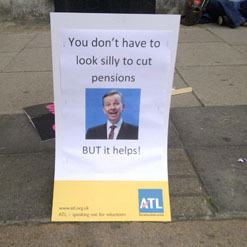Pensions strike impact minimal, says Government
Tens of thousands of public sector workers failed to turn up for work in one of the UK’s biggest instances of nationwide industrial action of recent times.
Teachers, lecturers, civil servants and other workers walked out in protest at controversial changes to their pensions, which they attacked as “unfair and unjust”.
Unions clashed with the Government over the impact of the strike, while Labour Leader Ed Miliband was told he was a “disgrace” for failing to support the action.

Public sector unions suggested hundreds of thousands walked out but the Government said the figure was fewer than 100,000. But there were also warnings that today’s action may not be the last.
Speaking to Channel 4 News, Mark Serwotka leader of the Public and Commercial Services union said more serious talks with the Government are needed: “What we’ve had up until now has been a chat, it’s not been a serious negotiation.
“Whilst we hope for the best we’re preparing for the worst. Every public sector union’s meeting at the TUC and we are talking to the bigger public sector unions about moving to ballot their members that could see the Autumn see much bigger strikes than we have seen today.”
FactCheck: are public sector pensions affordable?
Parliament picketed
More than 11,000 schools were affected according to figures from the Department for Education. Teaching unions suggested the numbers were higher, with the Association of Teachers and Lecturers saying that around 85 per cent of schools were fully or partially closed across England and Wales.
Kevin Courtney, deputy general secretary of the National Union of Teachers, said the union realised the action was “very disruptive for parents,” adding “we do regret that”.
“We had hoped to reach a settlement before the industrial action, but the Government isn’t serious about talks.”
There were picket lines outside schools, Government buildings, job centres and courts, and marches also took place across the country. Other buildings which were picketed included the Houses of Parliament, the Royal Courts of Justice and the headquarters of the education and business departments in London.




